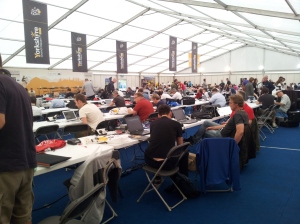I have spent most of the last two weeks with the fabulous communications team at Welcome to Yorkshire. To be able to contribute to the preparations and deliver y of the greatest Grand Depart in the history of the Tour de France has been an absolute privilege. From writing press releases and web copy to working on the media desk and media pit at the televised Opening Ceremony Team Presentation event at the Leeds Arena, I was desperate to be involved in any way I could!
y of the greatest Grand Depart in the history of the Tour de France has been an absolute privilege. From writing press releases and web copy to working on the media desk and media pit at the televised Opening Ceremony Team Presentation event at the Leeds Arena, I was desperate to be involved in any way I could!
Behind the scenes Dee Marshall’s small communications team worked tirelessly and meticulously to keep their loyal contacts happy as well as welcome the world’s media to Yorkshire. A purpose built media centre that accommodated 2,000 journalists and hosted media conferences with the cycling teams was a spectacular sight to see. The energy and excitement building to fever pitch in the three days that it was operating in the run up to the race launch on 5 July.
Since Yorkshire won the bid to ho st the Grand Depart, Welcome to Yorkshire (the regional tourist body) has done a stirling job working with regional businesses to realise the huge potential to the region. Most embraced this ‘gift’ which brought out the entrepreneurial spirit in many rural businesses who in turn contributed to the experience of the millions of people who turned out to support the cyclists – though I won’t mention the name of the pub that I visited on the route of Stage 2, after building up quite a thirst having spent 3 hours on the roadside in North Yorkshire, that had only one person serving on the bar!!
st the Grand Depart, Welcome to Yorkshire (the regional tourist body) has done a stirling job working with regional businesses to realise the huge potential to the region. Most embraced this ‘gift’ which brought out the entrepreneurial spirit in many rural businesses who in turn contributed to the experience of the millions of people who turned out to support the cyclists – though I won’t mention the name of the pub that I visited on the route of Stage 2, after building up quite a thirst having spent 3 hours on the roadside in North Yorkshire, that had only one person serving on the bar!!
In terms of delivering PR for one of the world’s greatest mega events, the team at Welcome to Yorkshire deserve recognition for their contribution; from managing royal visitors and show biz style pre event parties – one for 800 VIPs the night before the start of the Grand Depart – to ensuring that the ITV comentators had a wealth of sound bites about all the villages, towns and landscapes the peleton cycled through whilst they broadcast live. So a big thank you to the guys at WtY for letting me get involved. We look forward to a few guest lectures at Leeds Met in the coming year to reflect on your great success and gain insight into your Grand Depart legacy work and plans for your ‘next mega event’, Allez Allez Allez!
